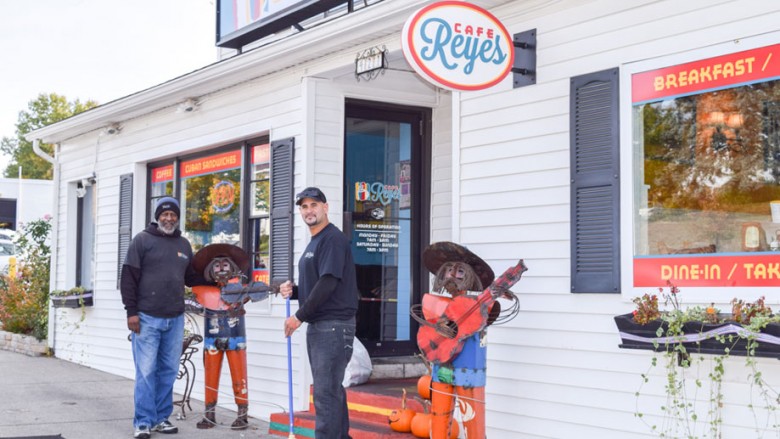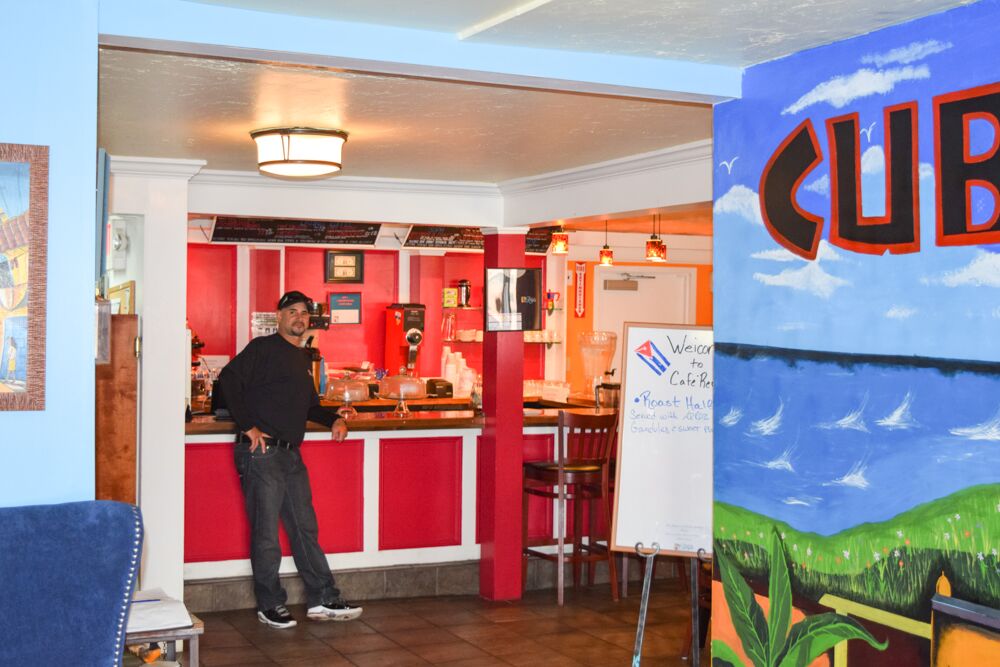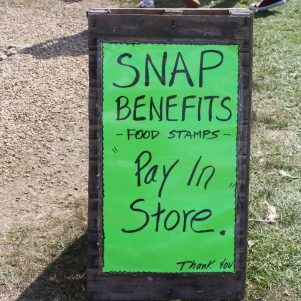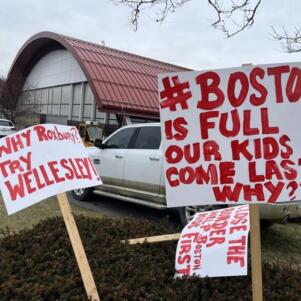Cuban refugee climbed from modest start to help addicts get clean
By Gina Kim | October 30, 2015, 11:35 EDT
 George Sharpe, left, and Jorge Delgado, work at the Cafe Reyes on Worcester’s Shrewsbury Street. The Cuban-themed restaurant provides a place where Reyes House program participants like Delgado can get work as they transition back to more normal lives. (NewBostonPost photo)
George Sharpe, left, and Jorge Delgado, work at the Cafe Reyes on Worcester’s Shrewsbury Street. The Cuban-themed restaurant provides a place where Reyes House program participants like Delgado can get work as they transition back to more normal lives. (NewBostonPost photo) WORCESTER – Dr. Matilde Castiel could probably give state policymakers plenty of advice about dealing with drug abuse and the deadly opioid crisis gripping Massachusetts.
The Cuban immigrant has been helping Latinos in Worcester overcome addiction for years in a treatment center and an innovative transitional assistance program that provides those in recovery with training and jobs.
“The numbers of addicts were staggering,” Castiel said in a recent interview, recalling her reaction to statistics she discovered once she started looking at the problem almost a decade ago. Substance abuse is often connected with mental-health issues, and she said that can spell trouble for people with low incomes.
“It’s a major problem that most don’t have access to mental-health care,” she said. “Most issues that surround physical health are also related to mental health, and in every aspect you look at, there is no care available.”
Abuse of opioids, including prescription pain killers like Oxycontin and illegal drugs like heroin, has risen to epidemic levels in Massachusetts and in other parts of the nation, according to federal, state and local officials. Opoids have been tied to 1,256 Bay State deaths in 2014, up from roughly 900 the year before and 456 in 2004, according to the state Department of Public Health. Gov. Charlie Baker has proposed drastic steps, including involuntary commitment, to deal with the crisis.
Castiel knows any solution won’t be easy. Drug abuse, she says, to some degree reflects a lack of access to proper medical care.
“Here in the Latino community, it takes months to see a psychiatrist,” Castiel said. “I think it takes so long to get help because reimbursements for psychiatry aren’t great, leading to a shortage of mental-health specialists – who aren’t getting paid well to begin with.”
The doctor, who arrived in Miami as a child unable to speak English in 1962, has spent much of her medical career trying to help people who are poor and disadvantaged, like she was growing up in the Los Angeles area. Given her origins and fluency in Spanish, she has grounded those efforts in Worcester’s Latino neighborhoods. About a fifth of the central Massachusetts city’s more than 183,000 residents are Hispanic, according to the most-recent data from the U.S. Census Bureau.
She completed her medical training in Worcester after arriving in 1989 and wound up practicing and teaching at the University of Massachusetts Medical School and hospital. In 2004, she founded Worcester’s Latin American Health Alliance and through it opened the 25-bed Hector Reyes House, a residential treatment center for substance abuse, in 2009. Last year, she led efforts to open a restaurant on Shrewsbury Street as a way to provide work and a paycheck to help the recovering men as they began to reestablish themselves. Called Café Reyes, it began serving food last year.
Jorge Delgado, a waiter at the restaurant, lived at the halfway house after receiving treatment at the Reyes Center facility. Like his coworkers, Delgado hopes to return to a more normal life.
“I had it all and I lost it,” Delgado said. “I’m working to get it back.”
It can be very tough to accomplish, however. Castiel said just 40 percent of those who enter the Reyes program graduate from it, after six months to a year, and not all stay clean.
“A good number of relapses happen and we sometimes get them back,” she said. “But that’s part of the disease, they know they can always come back if they need help.”
A recovering addict named Hector Reyes partly inspired her interest in substance abuse. She worked with Reyes to determine the extent of the problem in Worcester and on setting up the rehab center and halfway house that bear his name.
After all the effort Castiel and Reyes put into researching how much the community needs the center, she hopes the facility’s success will send a clear message as to why prison shouldn’t be substituted for treatment of those with a serious disease such as alcoholism or drug addiction. The center, house and café provide assistance to almost 100 people, and more are waiting to get into the program.
Castiel attributes her lifelong desire to help others and her motivation to become a doctor to her father, Israel, who had sent her off to America to escape Communism, and then followed a few months later, penniless but free. He passed away in 1995.
“I always saw my father getting very involved with people and helping others,” Castiel said of her childhood years in Southern California, where her father became an itinerant merchant.
“He sold things from the back of his car when he was working in East L.A. and gave people credit – in order to give people time to pay off whatever they purchased from him,” Castiel said. “From there, since everyone spoke Spanish, he got to know his customers and became invested in the community. I wanted to do the same, where I could help people and really get to know who I’m working with.”
After arriving from Cuba in the exodus of 14,000 children known as Operation Pedro Pan, Castiel and her eight-year-old brother were sent to Lakewood, a Los Angeles suburb, by the Jewish Family Services organization. There, they were placed in foster care until their parents arrived and established themselves with jobs and a home.
“I didn’t know a word of English when I first came to the States,” Castiel said. “My brother and I brought a dictionary with us when we got on the plane. My mother taught us how to say the word ‘hungry’ to make sure I’d eat. Basically, we just learned a few necessary words that we needed to survive.”
Eventually, they learned English. She thrived academically, especially in science. And she had her first inside look at the world of medicine.
“When I worked in a hospital during high school, one of the first things I witnessed was an open-heart surgery,” Castiel said. “I thought, what better way to get to know someone from the outside and know them from the inside than an operation?”
Following high school, she enrolled at California State University, Northridge, and excelled in a double-major program studying molecular biology and physical education. When she began to talk about medical school, she ran into resistance at home.
“At the time, my mother felt that women shouldn’t go to med school because it wasn’t a ‘female field,’” the doctor said. “But I knew I had my father’s support.”
“My father had a sixth-grade education and worked most of his young adult life to get his oldest brother through school,” Castiel said. “He had secretly wanted to become a medical doctor, so he was thrilled to relive vicariously through me when I finally made it into a med program.”
She studied medicine at the University of California, San Francisco, ultimately focusing on internal medicine and trauma care. She began working in hospital emergency rooms and while training in a St. Louis hospital, she met her future husband, Aaron Mendel. When he got a job offer in Worcester, she followed him to New England’s second-largest city, where she completed her medical residency.
“And that’s where I’ve been for the last 26 years, right here in Worcester. It’s been quite a change,” she said.
As she established her medical career, Castiel began to get involved with the city’s Latino community. She worked in outreach at UMass Medical and hosted health clinics through the Worcester Housing Authority. It was there she met Reyes, who had a dream of setting up an addiction treatment center. In 2004, Castiel began working with him to lay the groundwork for a rehab facility to serve Latinos.
But unforeseen challenges arose.
“While we were able to acquire a financial grant from the Public Health Department to build the treatment facility, we realized that those who graduated from the program still couldn’t find a place to live or have a chance at steady income,” Castiel said.
So they raised money to acquire a residential building adjacent to the rehab center, which became the Reyes House to provide a transitional accommodation in the same year that Reyes, its namesake, died. The café which followed some five years later provided the link for recovering patients to help them get back to more normal lives.
Just over a month ago, Worcester tapped Castiel to run its newly reconstituted Health and Human Services Department, partly in recognition of her work to help people in the city with substance abuse problems. While she has handed over the reins of the rehab center, the transitional home and the café to her husband, she remains a revered figure to the staff and patients they serve.
Castiel, known as Mattie to friends, is “Mom” not just to her two sons but to the people in the Latino community for whom she has done so much. She says the nickname is apt.
“I always feel responsible and I hope that I help in every way possible,” Castiel said. “I do see all my patients from the community as my kids. I get angry with them the same way I get with my own kids at home, but that’s how I know I’m always there for them.”
NBPDiversity













